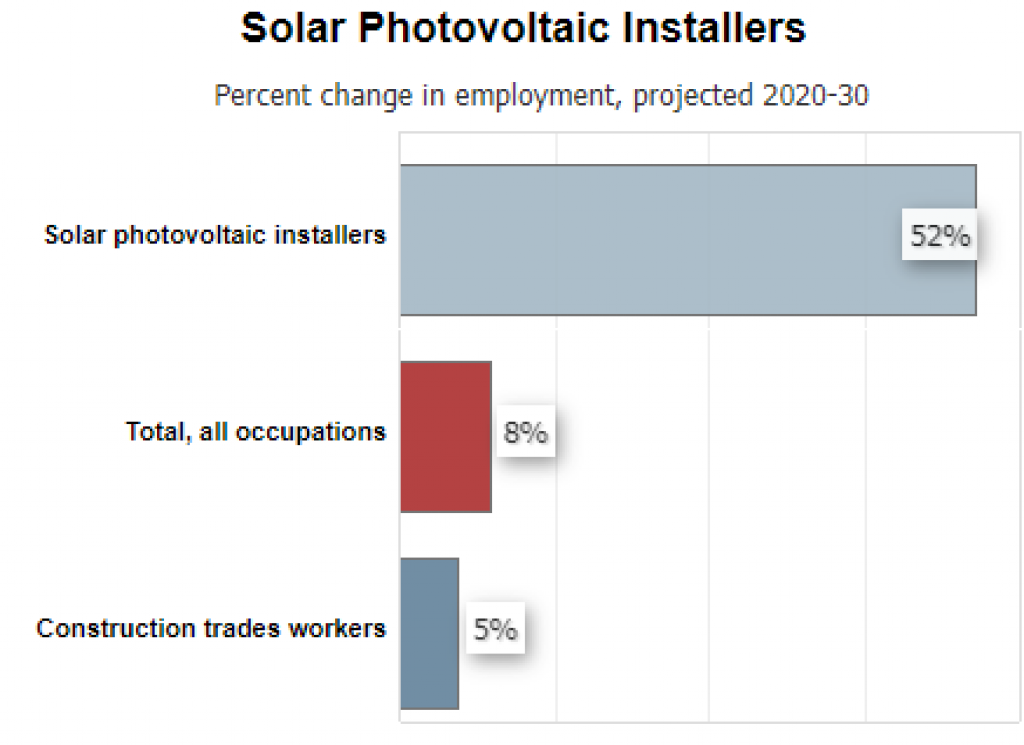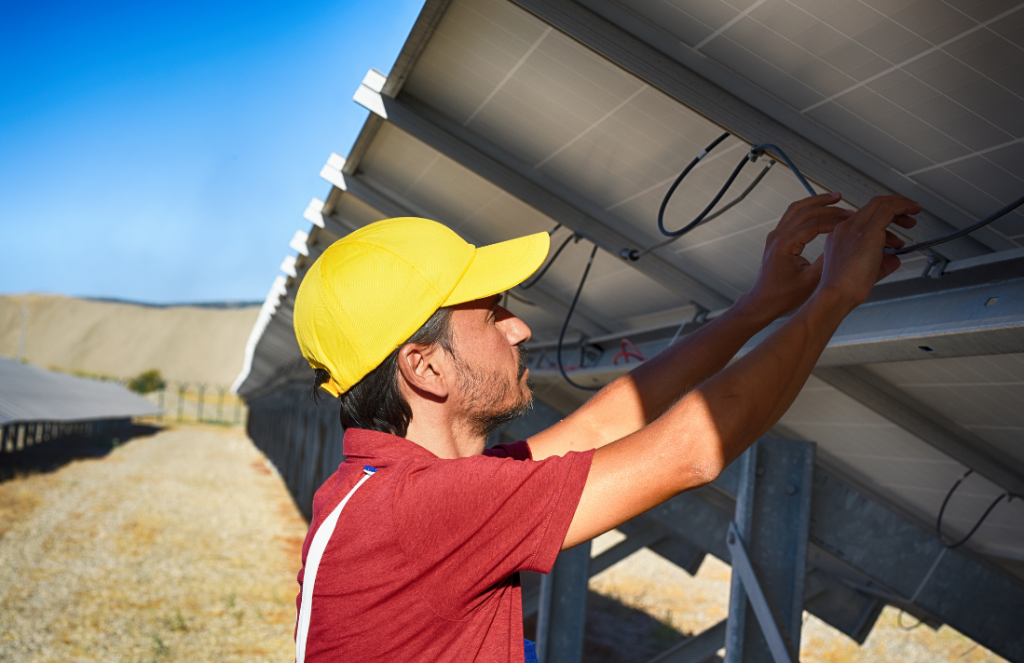Are you interested in renewable energy? Do you want to know how to become a solar panel engineer? Then you’ve come to the right place!
Solar panel engineering is a growing field, and there are considerable opportunities for people with the right skills.
In this article, we outline what you need to do to qualify for this exciting career.
We also provide you with some tips on how to make yourself stand out from the competition.
So if you’re ready to learn more about becoming a solar panel engineer, keep reading!
Table of Contents
What Does A Solar Panel Engineer Do?
Solar panel engineers are responsible for designing and implementing solar photovoltaic (PV) systems. They work with architects and builders to integrate solar PV systems into new construction projects or retrofit existing buildings.
Many solar engineers work for solar energy companies, engineering firms, or electric utility companies. Some may also work for the government or private research organizations. As such, they typically work full time, with some jobs even requiring overtime.
These engineers develop site-specific solar PV system designs, including solar panel layouts and array configurations. In addition, they typically oversee the installation of solar PV systems and perform quality assurance testing to ensure that the systems meet all performance specifications.

Strengths
Solar panel engineers must have a strong knowledge of physics, chemistry, and mathematics. They also need to be familiar with solar energy technologies and manufacturing processes.
Specializing
There are several specialized fields within solar engineering, including electrical engineering, mechanical engineering, and chemical engineering.
Employment Growth Projection For A Solar Engineer
According to the solar engineer employment growth projection, solar panel engineers are expected to experience rapid growth in employment over the next decade. In fact, solar engineering is one of the fastest-growing industries in the United States.
The employment of solar photovoltaic installers is expected to grow by nearly 52% over the next 10 years. There are several reasons for this projected growth:
- Solar energy is becoming increasingly popular as a renewable and clean energy source. Moreover, solar panels are becoming more efficient and less expensive, making them a more viable option for homeowners and businesses.
- Government incentives and tax breaks are making solar panels more affordable for consumers.
- As awareness of the environmental benefits of solar energy grows, more people are interested in installing solar panels.

How Much Does A Solar Engineer Earn?
Solar engineers are in high demand as the world approaches renewable energy sources. But how much does a solar engineer earn?
The median annual salary for a solar panel engineer is $91,410, with a salary range of $79,530 to $103,290.
With the right skills and experience, you could earn an annual salary of over $100,000.
Related Reading: Is Environmental Science Worth It? (An expert’s opinion)
How Long Does It Take To Become A Solar Engineer?
The time it takes to become a solar engineer depends on the individual’s educational background and work experience.
- Bachelors: individuals with a bachelor’s degree in engineering typically take four years to complete their degree program.
- Masters Or Ph.D.: those with a master’s degree or Ph.D. typically take two to four years to complete their programs.
- Other Degree: those with a degree in another scientific discipline may take longer to complete their training.
Certification
Solar engineers typically need to be certified as professional engineers. The time it takes to become certified as a professional engineer varies by state but generally is two to four years.
Solar engineers who are not certified as professional engineers may still find employment in the solar power industry, but their career paths will be limited.
SEIA
Additionally, some solar engineers may choose to become certified by the Solar Energy Industries Association (SEIA). The SEIA offers certifications for both entry-level and journeyman solar engineers. This requires solar engineers to acquire continuous education credits every 2 years.

How To Become A Solar Engineer
Personal Skills Required
Becoming a solar panel engineer requires more than just technical skills. Solar engineers must communicate effectively, work well in teams and manage projects.
Here are some critical skills you’ll need to succeed in this exciting and growing field.
Communication Skills
As a solar engineer, you’ll need to communicate your ideas clearly and effectively in writing and in person. You’ll also need to listen to and understand the concerns of clients, solar panel installers, and other team members.
Good communication skills will help you explain the solar PV system designs you create and troubleshoot any problems that arise during construction or operation.
Teamwork Skills
Solar engineering is a highly collaborative field, so you must be capable of working as part of a team. You’ll need to be able to share ideas and information openly and respect the expertise of others on the team.
At the same time, you’ll need to be able to take direction when required and work independently.
Project Management Skills
As a solar engineer, you’ll need to manage projects from start to finish. This includes developing project budgets and timelines, coordinating with solar panel installers and other contractors, and ensuring that the project stays on schedule and within budget.
Good project management skills are essential to the success of any solar PV installation.
Technical Skills
Of course, solar engineers also need to have strong technical skills. This includes a deep understanding of solar PV systems, experience with solar panel installation, and the ability to use engineering software to design solar PV systems.
If you’re planning on becoming a solar engineer, developing your technical skills as early as possible is essential.
Education Required
The first step on the education ladder is to obtain a bachelor’s degree in engineering from an accredited university.
Following undergraduate studies, a prospective solar panel engineer must then complete a four-year master’s program in solar engineering at an accredited institution.
In addition to traditional classroom instruction, solar engineers need to have practical experience working with solar panels and other solar equipment.
As the demand for solar energy increases, it is likely that the educational requirements for solar engineers will become more specialized and formalized. For now, however, those interested in becoming solar engineers should focus on getting the best education possible in engineering and related fields.
Experience Required
Solar engineers must have experience working with solar technology and solar energy systems and experience in electrical engineering and project management. Five years of experience working in the solar power industry is standard.
Furthermore, it is helpful to have installation and maintenance experience. This experience can be gained through internships, co-op programs, or entry-level positions at solar companies.
Additionally, solar engineers must be familiar with the codes and standards that govern solar power systems. Familiarity with these codes and standards is typically gained through on-the-job training.
Solar engineers can become certified through the International Solar Energy Society (ISES).

License & Certification
States typically require professional engineers to have a bachelor’s degree in engineering, pass a written exam, and complete several years of internship experience.
Many solar engineers also become certified through the American Society of Mechanical Engineers or the International Society of Certified Electronics Technicians. However, to maintain their certification, solar engineers must engage in continuous training.
Additionally, some solar engineers may pursue voluntary certification through the North American Board of Certified Energy Practitioners (NABCEP). To be certified, solar engineers must have at least two years of experience in the solar industry and pass an examination.
Although it is not required, solar panel engineers may also choose to become certified by the International Solar Energy Society (ISES). Certified solar panel engineers have demonstrated their knowledge and skills in the solar energy field through examinations and/or credits obtained through continuous training.
Accreditation Board for Engineering And Technology (ABET)
Solar engineering is one of the many engineering disciplines that the Accreditation Board regulates for Engineering And Technology (ABET).
To be accredited, solar engineering programs must meet specific educational requirements. For example, they must have a firm grasp of solar physics and energy conversion.
In addition, solar engineers must be able to design, develop, and operate solar power systems. ABET regularly evaluates and reviews accredited programs to ensure that solar engineering programs meet these standards.
As a result, students who graduate from an ABET-accredited solar engineering program can be sure they have received a high-quality education.
North American Board of Certified Energy Practitioners
The North American Board of Certified Energy Practitioners (NABCEP) is the solar industry’s gold standard for certification. Established in 2002, NABCEP provides a voluntary, nationally recognized certification program for solar installers, solar designers, and solar engineers.
To become certified, candidates must pass an exam that covers solar PV theory, systems design, and installation best practices. In addition, candidates must have at least two years of experience working with solar PV systems.
As the solar industry continues to grow, NABCEP certification is becoming increasingly crucial for solar professionals seeking to stand out from the crowd. With its rigorous standards, NABCEP provides solar employers and consumers with a valuable way to ensure that solar practitioners are knowledgeable and qualified.
International Solar Energy Society (ISES)
The International Solar Energy Society (ISES) is a solar engineering organization that strives to further the use of solar energy worldwide. They do this by providing resources and support for solar engineers, solar energy researchers, and solar energy businesses.
Here are the requirements to become a member of ISES:
- Prospective members must have an educational background or professional experience in solar energy.
- Solar engineers must uphold the ISES Code of Ethics, which includes ensuring the safety of solar installations and promoting the use of renewable energy.
- Prospective members must pay the annual membership fee, which helps to support society’s activities.
By meeting these requirements, members of ISES can play an essential role in advancing solar power technology.
American Society of Mechanical Engineers (ASME)
The American Society of Mechanical Engineers (ASME) is a professional organization that provides credentials and licenses solar engineers in the United States. The solar engineering field is one of the most rapidly-growing engineering sectors, and solar engineers are in high demand due to the increasing popularity of solar power.
ASME provides certification for solar engineers who have completed a four-year accredited engineering program. To be eligible for accreditation, solar engineers must pass an examination that covers topics such as solar photovoltaic systems, solar thermal systems, and solar energy storage systems.
ASME also requires solar engineers to have at least four years of professional experience in the solar engineering field. Solar engineers certified by ASME are highly sought-after by employers and can command high salaries.
Therefore, it is worth researching the American Society of Mechanical Engineers’ requirements if you are interested in becoming a solar engineer.
Solar Energy Industries Association (SEIA)
The solar industry is one of the fastest growing industries in the United States, and the Solar Energy Industries Association (SEIA) is the leading trade organization for solar companies.
SEIA members range from solar engineers to manufacturers and installers, and they are committed to advancing solar technologies and expanding solar markets. To become a member of SEIA, companies must meet specific requirements.
- First, they must be actively involved in solar energy through research, development, manufacturing, or installation.
- Second, they must support SEIA’s mission to create a bright future for solar energy. Finally, they must agree to adhere to SEIA’s code of ethics.
SEIA members demonstrate their dedication to the solar industry and its continued growth by meeting these standards.
Related Reading: 12 Best Paying Renewable Energy Jobs
Final Thoughts
Solar engineers play an important role in our society by helping us create a more sustainable future. They work on designing and installing solar panels and systems that convert sunlight into electrical energy.
The employment growth projection for solar engineers is very positive, so this is a great career choice if you want to make a difference. The average salary for solar engineers is also good, and with the proper education and experience, you can be on your way to this rewarding career.
The solar industry is one of the most rapidly-growing industries in the world, and solar engineers are in high demand. Certification from organizations like NABCEP, ISES, and ASME can help solar engineers stand out from the crowd and command high salaries.
We hope this article has given you a good overview of what solar engineering entails and what you need to do to become a successful solar engineer.
Are you ready to take on the challenge?

